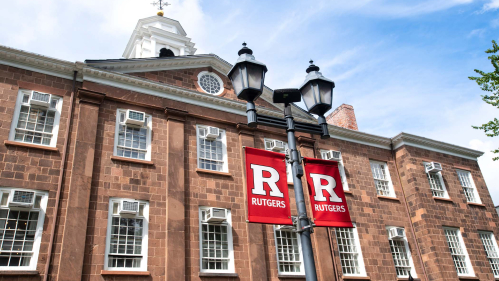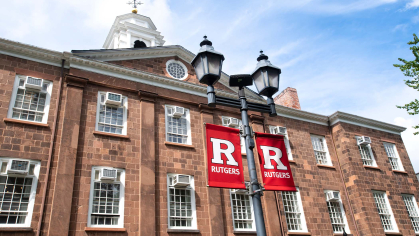Rutgers Board of Governors Approves $5.6 Billion Budget, 4 Percent Increase in Tuition, Fees

University focuses on affordability for students while managing rising costs
The Rutgers Board of Governors today approved a $5.6 billion operating budget, supported in part by a 4 percent increase in tuition and fees for the 2024-2025 academic year.
Tuition for a typical full-time arts and sciences undergraduate who is a New Jersey resident will increase on average $274 per semester from $6,837 to $7,111. Fees vary by program, but average mandatory fees are estimated to increase by about $63 per semester.
Rutgers continues to improve access and affordability for students through income gap-bridging programs, including the Scarlet Guarantee in New Brunswick, RU-N to the TOP in Newark, and Bridging the Gap in Camden, which complement New Jersey’s Garden State Guarantee. Last year, through these and other programs and Rutgers institutional financial aid, about 75 percent of Rutgers undergraduates received some form of student financial aid.
The budget for the fiscal year that began July 1, 2024, reflects a rise in operating costs associated with increases in negotiated salaries, employee benefits including health insurance premiums and pension contributions, need-based student financial aid and inflationary increases in supplies and general operating expenses.
"We are committed to providing access to an excellent academic experience and this budget reflects that commitment while meeting our financial responsibilities,” said Amy Towers, board chair.
The majority of the budget – 77 percent – is spent on the university’s core mission of student instruction, research, public service and health care. Nearly 15 percent is allocated for administration, operations and maintenance; 5 percent funds services including housing, dining and parking operations; and 3 percent is spent on Division I athletics.
“This budget is prudently planned to allow us to meet rising costs while continuing to do what Rutgers does best: provide our students with exceptional academic, research and public service opportunities as they pursue their education and become engaged citizens,” President Jonathan Holloway said.
The majority of the budget funds:
-
Classroom instruction and academic support, including faculty compensation and staff support for academic units, libraries, and deans’ offices (33 percent of the budget)
-
Student services and scholarships, including financial aid and social and cultural events (11 percent)
-
Sponsored research and other sponsored programs, including funds spent on research associated with federal, state and nongovernmental grants and contracts (12 percent)
-
Public service, extension and health care, including agricultural extension programs, delivery of health care, support for health clinics and community services provided throughout the state (21 percent)
Funding for the budget, up from $5.4 billion last year, comes largely through tuition and fees (27 percent); the State of New Jersey (21 percent); health care services (20 percent); sponsored research (15 percent); and miscellaneous sources, including housing, dining, parking services, student aid, athletics, gifts and donations, and endowment and investment income (17 percent).
“This year, efforts will continue to strengthen the university’s long-term financial sustainability,” said J. Michael Gower, Rutgers’ executive vice president, chief financial officer and treasurer.
“We are looking for ways to do things differently and better as we pursue opportunities to generate additional net revenue to fund new initiatives, make maintenance improvements and replenish reserves,” he said.


